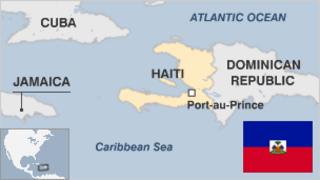Home » Latin America »
Haiti country profile
Haiti became the world’s first black-led republic and the first independent Caribbean state when it threw off French colonial control and slavery in the early 19th century.
But independence came at a crippling cost. It had to pay reparations to France, which demanded compensation for former slave owners. The 19th century “independence debt” was not paid off until 1947. There have been recent calls for France to repay the money.
Chronic instability, dictatorships and natural disasters in recent decades have left it as the poorest nation in the Americas.
An earthquake in 2010 killed more than 200,000 people and caused extensive damage to infrastructure and the economy.
A UN peacekeeping force was put in place in 2004 to help stabilize the country, and only withdrew in 2017.
FACTS
Republic of Haiti
Capital: Port-au-Prince
Population 10.2 million
Area 27,750 sq km (10,714 sq miles)
Major languages Creole, French
Major religion Christianity
Life expectancy 61 years (men), 64 years (women)
Currency gourde
LEADER
President: Jovenel Moise
Jovenel Moise was sworn in as president in February 2017.
His inauguration ended a protracted electoral crisis that began in October 2015, when elections were annulled over allegations of fraud.
Mr Moise was finally declared the winner of the November 2016 presidential elections by an electoral tribunal in January 2017.
A businessman and the chosen successor of former President Michel Martelly, Mr Moise had never held political office before.
MEDIA
Radio is Haiti’s leading news medium and there hundreds of local, privately-owned stations.
The media reflect a range of views but the work of journalists is hampered by threats and violence, press watchdogs say.
Around 19% of Haitians were online by 2019.
TIMELINE
Some key dates in Haiti’s history:
1804 – General Jean Jacques Dessalines proclaims the independent black republic of Haiti after rebel slaves defeat French troops dispatched by Napoleon Bonaparte.
1915 – US invades following black-mulatto friction, which it thought endangered its property and investments in the country.
1934 – US withdraws troops from Haiti, but maintains fiscal control until 1947.
1957 – Francois “Papa Doc” Duvalier wins elections. He eventually turned his administration into a brutal dictatorship.
1971 – Papa Doc dies and is replaced by his son Jean-Claude “Baby Doc” Duvalier.
1986 – President Duvalier is forced into exile by an uprising, ending a 29-year family dictatorship.
1990 – Populist priest Father Jean-Bertrand Aristide is the landslide winner in a presidential election, Haiti’s first free and peaceful polls.
1991 – President Aristide is overthrown by the military.
1994 – 20,000 US troops arrive to restore democracy. Jean-Bertrand Aristide returns.
2004 – President Aristide leaves Haiti again amid a rebellion. US Marines land to restore order. A UN stabilisation force is put in place.
2010 – More than 200,000 people are killed when a magnitude 7.0 earthquake hits the capital Port-au-Prince and its wider region – the worst in Haiti for 200 years.
Source: Read Full Article



